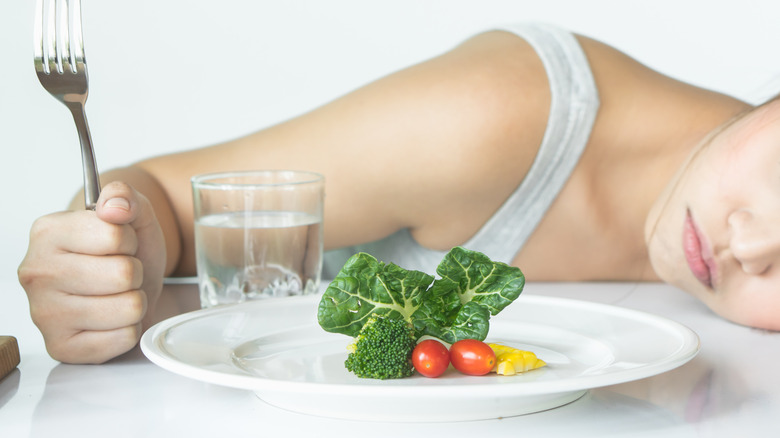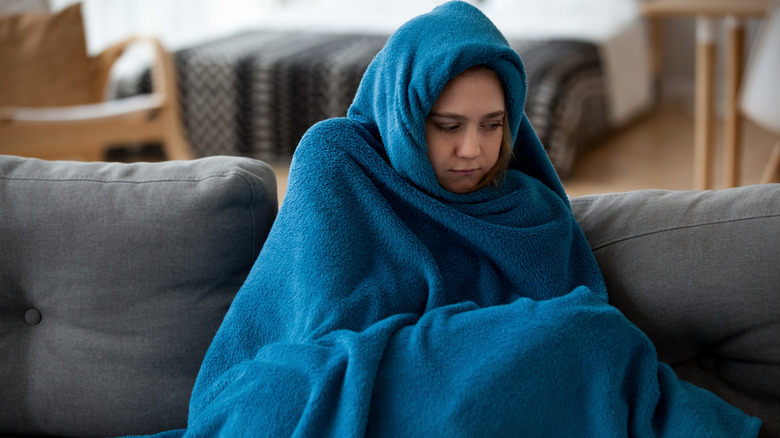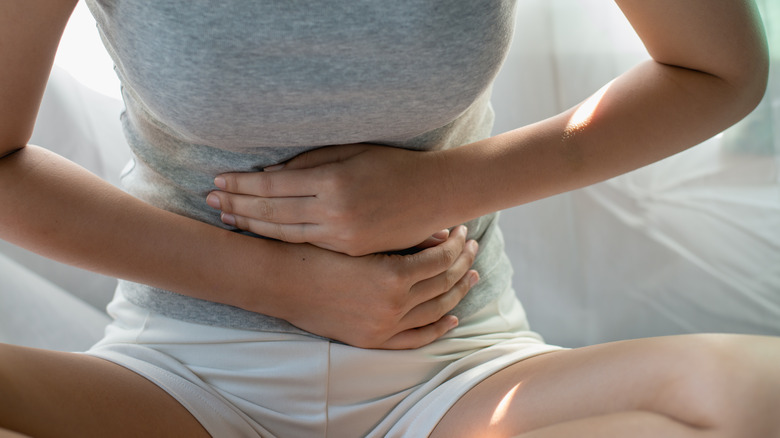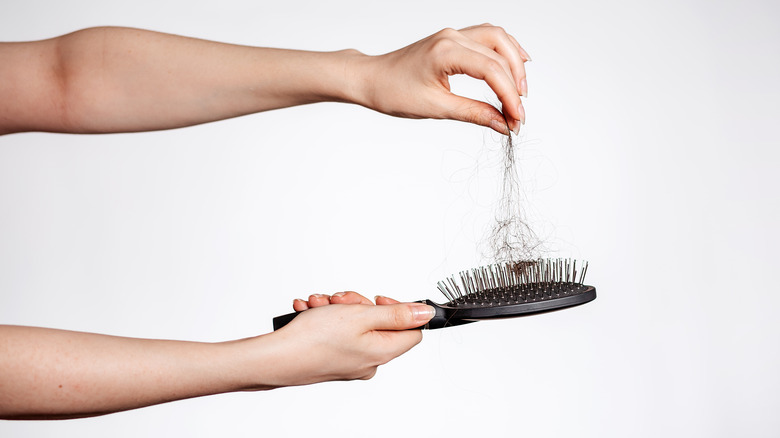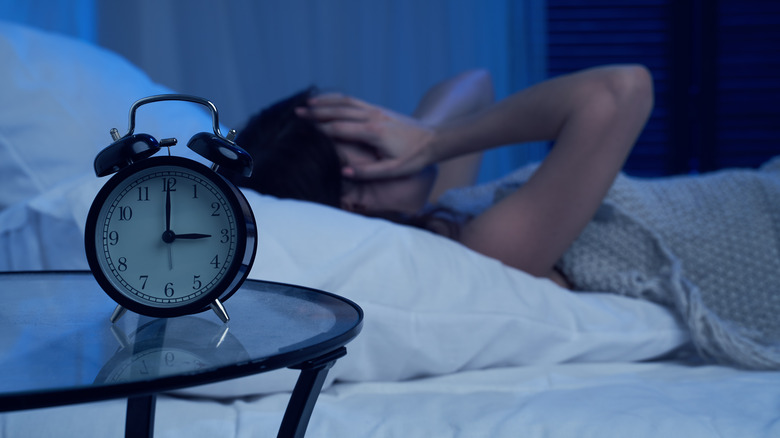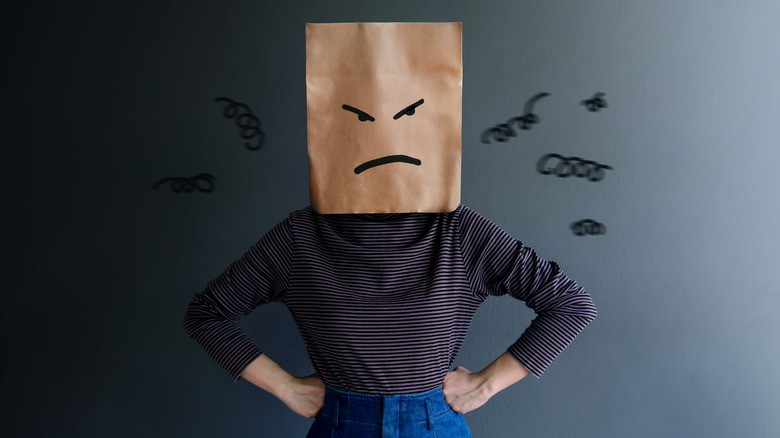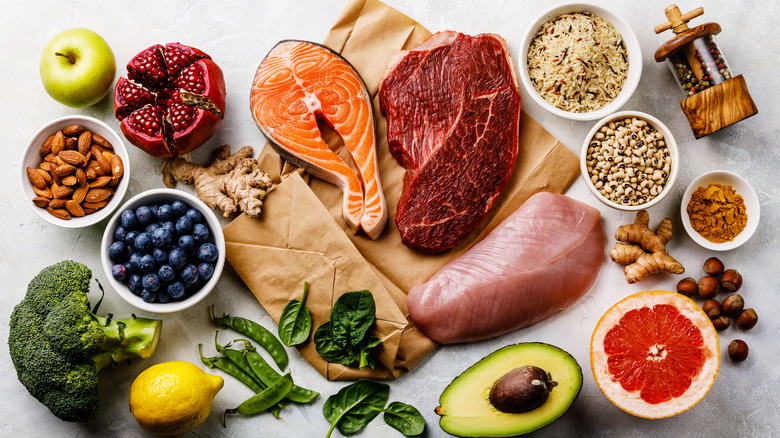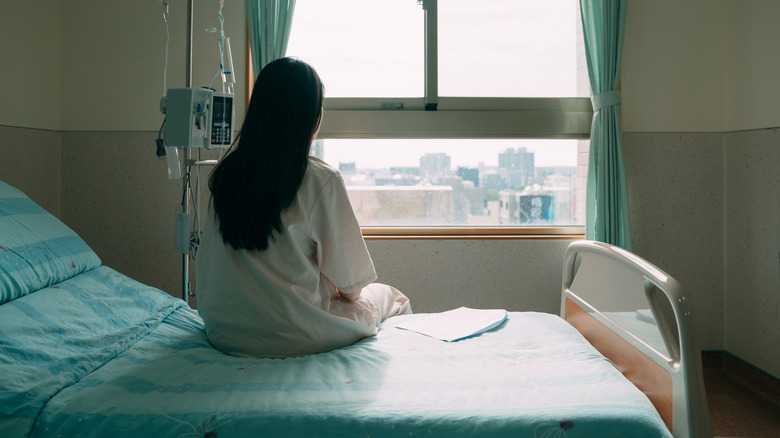Expert Reveals 5 Signs You're Not Eating Enough
When the conversation turns to nutrition and what we should and should not be eating, most times the discussion revolves around what happens if we eat too much. Yes, we are all well aware that obesity rates are on the rise, despite the fact that we may now better-informed about our health than ever before.
Dr. Elizabeth Klingbeil, a Registered Dietitian Nutritionist who also works as an Assistant Professor at Johnson & Wales University, says that overeating isn't the only way to sabotage your health, though. In fact, eating too little can also be a problem, as well as failing to consume the proper amounts of certain necessary nutrients. As she tells Mashed, "Weight and appearance are a small part of how we can measure someone's health. If an individual is not getting adequate nutrition, many different aspects of their body processes can be impacted." She listed for us 5 of the main symptoms you may experience if you're restricting your diet too much, but clarifies that "These symptoms are not only from a lack of calories, you can have these symptoms from an insufficiency of specific nutrients (i.e. protein, fats, carbohydrates, vitamins, and minerals) despite adequate caloric intake."
You're constantly cold
Can't seem to stop shivering? If it seems like you're always cold, no matter what the thermostat reads, this could be because you're not getting enough to eat. You shouldn't have to be cranking up the heat and piling on the blankets in the middle of summer, though, at least not unless you live somewhere south of the equator. It could well be that the one thing that will combat the cold is a good meal.
The way Kllingbeil explains it, "Your body needs calories in order to maintain and regulate body temperature." So what happens if you are severely restricting your calorie intake? In that case, Klingbeil tells is, "If you are not consuming enough calories, your body is going to struggle to keep your internal temperature at the appropriate level." Time to tuck into a nice hearty bowl of stew, since it turns out that such a thing really can warm you up inside and out.
You're experiencing tummy troubles
According to Klingbeil, "The saying "use it or lose it" is partially true when it comes to our digestive tract." What she means by saying this is, it's the job of your digestive system to, well, digest, and if we stop or minimize our food consumption, she warns that the digestive system may lose its ability to function as it should.
"Specifically," says Klingbeil, "if you stop eating a certain food, such as dairy, [y]our bod[y] will stop making the necessary enzyme to break down those foods." So what will happen then? Nothing pleasant. Klingbeil cautions, "The next time you'd consume dairy, you may have bloating, diarrhea, cramping, or nausea related to the fact that your body no longer properly digests that food." This can happen if you cut out any one particular type of food from your diet – not just dairy but meat, grains, or anything else you might think to omit. "Because of this," says Klingbeil, "I highly encourage people to never cut out an entire food group ... unless they have a legitimate allergy."
Your hair is falling out
Have you been seeing a lot more hair in your hairbrush each morning, and your shower drain is constantly getting clogged with more hair than ever before? This can be worrying since no one wants to lose their hair. Hair loss can be caused by a number of things, including stress, hormones, and disease, but it can also happen due to a poor diet.
In particular, there is one important nutrient your body may be missing if you're starting to shed your hair. "Hair loss," says Klingbeil, "is a common sign of a lack of protein in your diet." According to a study published in the journal Dermatology Practical & Conceptual (via NCBI), acute telogen effluvium (TE), which is the medical term for hair loss due to bodily stress, frequently accompanies sudden weight loss as well as any decrease in consumption of protein. If you really want to eat hair-healthy foods, you could start with a fatty fish like salmon, since its omega-3 fatty acids will help make your hair strong and shiny. Other good sources of protein that can help your hair grow include eggs, black beans, and bone broth.
You're not sleeping well
Getting a good night's sleep every night is absolutely essential to your body's health, but in many cases, it's easier said than done. While you may be tempted to treat your sleep issues by popping a pill, as a long-term strategy, you'd be far better off determining the underlying cause and addressing that, instead.
One place to start would be to take a good look at your diet. You know how some people claim the secret to a happy marriage is never to go to sleep mad? Well, the secret to getting a full 8 hours of sleep may be to never go to bed hungry. As Klingbeil tells us, "Your body can't magically create the nutrients you need just because you're sleeping. You have to have a well-balanced diet that is rich in your essential nutrients in order for your body to be able to recover or rebuild itself." If you neglect to consume an adequate amount of healthy food, she says the result may be "lack of sleep or inability to sleep well."
You're always grumpy
Improper nutrition can even affect your mood. If you're easily irritated and you're starting to get the feeling you're carrying your own personal little black cloud with you wherever you go, it could be because of something you ate – or rather, didn't eat. As Klingbeil points out, "Food plays a huge role in our mental health."
You might be surprised, though, to find out what kind of food you really should not be omitted from your diet if you want to maintain a positive mental attitude. According to Klingbeil, "Carbohydrates are the main fuel for our brains." What this means is, if we cut carbs out of our diets entirely or severely limit the amount of carbs we eat, she cautions, "We can easily see a change in mood or mental status." As Klingbeil says, "The idea of eating a good [carb-inclusive] meal before a big test is actually true."
What's the one element you're missing from your diet?
If there's just one takeaway you get from Klingbeil's expert advice on your diet, it should be to eat a well-balanced one. "Something that all great registered dietitians understand," she tells us, "is the importance of moderation and balance in your diet." In other words, she explains, "You can consume too much of any food, whether it be cake or carrots."
Instead of basing your diet around the consumption or omission of any one particular food or category of foods, she says you should be filling your plate with a variety of different foods from all the food groups. She also thinks you should be eating the rainbow by consuming foods of all different colors: green vegetables, red meat, white milk, and brown rice can all fit into a healthy daily diet. "There are no 'good' or 'bad' foods," Klingbeil explains, going on to say that "any food can fit into a balanced diet as long as you are moderating it correctly."
How poor nutrition can affect your long-term health
If you're not eating enough food, or your diet doesn't include a sufficient variety of food, the problems you'll likely experience won't just manifest themselves in a few temporary inconveniences. Instead, you could be setting yourself up for some serious health concerns down the line.
Klingbeil says there are a variety of health issues that may develop due to poor nutrition, and lists among the more serious ones cardiovascular problems, cognitive decline, interruption of regular hormonal cycles, loss of lean body mass, osteoporosis, and wounds healing slowly or not at all. She also adds that specific vitamin and mineral deficiencies can lead to mental health issues, including depression as well as problems with hair and nails, skin rashes, and stunted growth. "It is important to note," she points out, "that symptoms are highly dependent on which nutrient you are not consuming enough of and not all symptoms will be equally displayed by everyone with an inadequate nutrient intake."
If you are struggling with an eating disorder, or know someone who is, help is available. Visit the National Eating Disorders Association website or contact NEDA's Live Helpline at 1-800-931-2237. You can also receive 24/7 Crisis Support via text (send NEDA to 741-741).
